 About GamePeople
About GamePeople
Subscribe to the Novel Gamer column:![]() RSS or
RSS or
![]() Newsletter.
Newsletter.
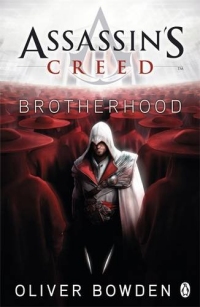
Format:
Book
Genre:
Adventuring
Style:
Competitive
Cooperative
Thirdperson
Singleplayer
Further reading:
Homefront: The Voice of Freedom (Book)
Buy/Support:
Support Chris, click to buy via us...
Other GamePeople columnists have reviewed this from their perspective - huh?:
Family Gamer (PS3)
Returning Gamer (PS3)
Reporting Gamer (PS3)
Story Gamer (360)
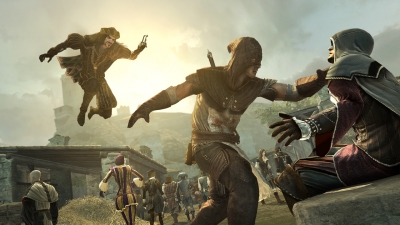
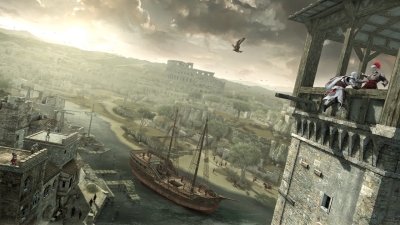
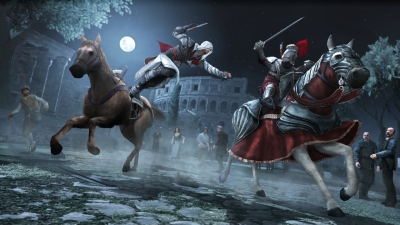
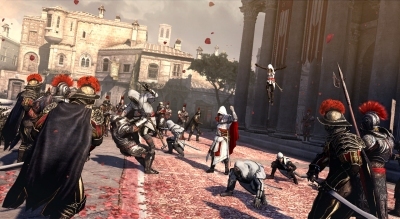
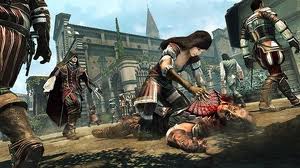
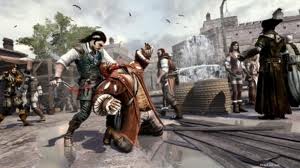
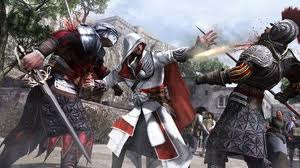
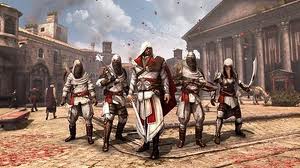
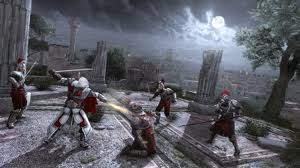
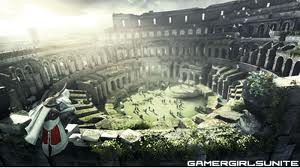
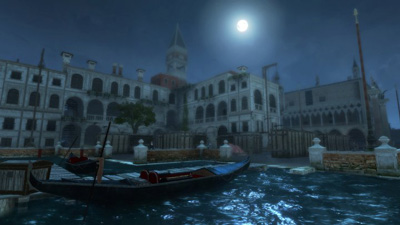
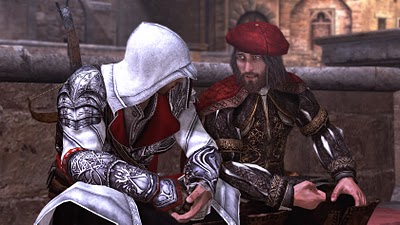

Assassin's Creed: Brotherhood, the novel, is marketed as a faithful game-to-book adaptation of the in-game adventures. That is exactly what it is, less clear however is who would read something like this.
My timing in coming across the Assassin's Creed: Brotherhood novel worked out great for me. I had just finished playing Assassin's Creed II (to platinum - go me!) and, while I was fascinated by the story and the historical setting, I had a few gripes with the game-play which were sufficient to deter me from wanting to take the plunge with Assassin's Creed: Brotherhood. At least until it becomes a bargain.
So it was with some gusto that I took up the novel version of Brotherhood and began reading, in order to find out what happens next to gaming's beloved assassin in robes.
The novelisation fulfilled my desire to follow the assassin Ezio's continued journey to a fault - that fault being adhering too closely to the sometimes bizarre world we are expected to swallow by the game.
My main disappointment though, was with this telling of the story. In Assassin's Creed I enjoyed that the story took place on two levels. In the present day, we follow Desmond - forced to relive the experiences of his Assassin ancestors through memories locked in his DNA and released through a science-fiction device known as the Animus.
Then, through first the crusades and later Renaissance Italy we witness the trials of the Assassin order against the Templars. What works about this tiered storytelling is that, while we are participating in the historical actions of the Assassins, we are also keenly aware that there is a thread of history which leads from the past to Desmond's present and the modern day battle between the Assassins and the Templars.
It loses a big part of what makes the Assassin's Creed fiction so compelling.
The book eschews this storytelling device in favour of Ezio Auditore's point of view. The duality of Assassin's Creed's plot is stripped away in favour of a purely historical perspective, detailing the adventures of Ezio against the Borgias and aided by other historical figures, such as Leonardo Da Vinci and Machiavelli.
In doing this, the book actually loses a big part of what makes the Assassin's Creed fiction so compelling. Without the anticipation that events are leading up to a truth about our present reality, the story becomes open-ended and loses its driving force. Ezio's memories were always incomplete, showing only those periods of activity which related to Desmond's search for information. In the book, therefore, these strange periods of inactivity are never properly accounted for.
While the author does a good job of realising Ezio's character for the reader it becomes harder and harder to understand his drive and motivation. It simply becomes a trail from one encounter to the next all the while leading to an outcome which doesn't seem driven by events.
This feeds into the other major problem I have with this book. It sticks far too closely the source material. I recently reviewed the thoroughly enjoyable Homefront: The Voice of Freedom (Book) and noted that the authors had taken the wise step of telling a parallel story to its source material in the game. By following the events of Assassin's Creed: Brotherhood too closely, this book feels like someone recounting the experience they had of playing the game.
Imagine this - in the game, one may witness a plot encounter between Ezio and, say, the head of the thieves' guild. At the end of the conversation, the group will be surprised by a unit of four guards, two in heavy armour with halberds and two in lighter uniforms with short swords. Having defeated the guards, the level of alert in the area returns to normal, as long as the player remains out of sight.
In a work of fiction, these elements seem odd and out of kilter with reality.
These events make sense in a game, because the interactive medium requires that players are given action sequences to drive things forward and break up the storytelling. The return to a passive alarm state allows the player to manage the challenge and "take a breather" between tricky sections.
However in a work of fiction, these elements (which we take for granted in a game) seem odd and out of kilter with reality. For me, the book fails because it provides a description of events which seem less like a character-driven story and more like a fan's faithful diary of their exploits in each level of the game. It continually refers to weapons, skills and player abilities like a check-list of points to cover.
If you're short of a book to read I would suggest that there are plenty of other quality titles more worthy of your time. Even if, like me, you really want to know what happens to Ezio, Desmond, Leonardo and the rest you will be better served by playing Brotherhood rather than reading about it.



Chris Jarvis writes the Novel Gamer column.
"I write stories to say what I think about games, for me it's the only way I can really communicate what I feel about them. Do you ever have a response to something that's hard to put into words? I find that sometimes I have something to express that can't be communicated by trying to explain how I feel, directly."
Here are the games I've been playing recently:
© GamePeople 2006-13 | Contact | Huh?

|
Family Video Game Age Ratings | Home | About | Radio shows | Columnists | Competitions | Contact
With so many different perspectives it can be hard to know where to start - a little like walking into a crowded pub. Sorry about that. But so far we've not found a way to streamline our review output - there's basically too much of it. So, rather than dilute things for newcomers we have decided to live with the hubbub while helping new readers find the columnists they will enjoy. |
Our columnists each focus on a particular perspective and fall into one of the following types of gamers:
|